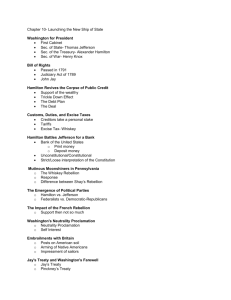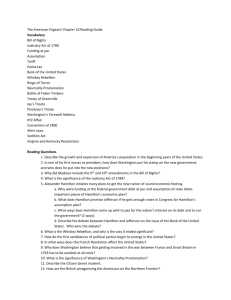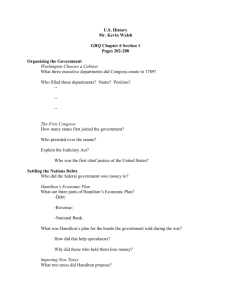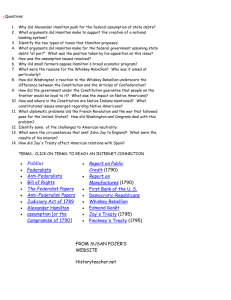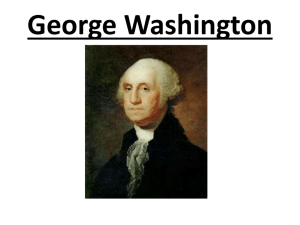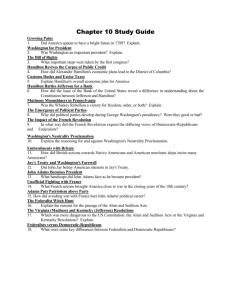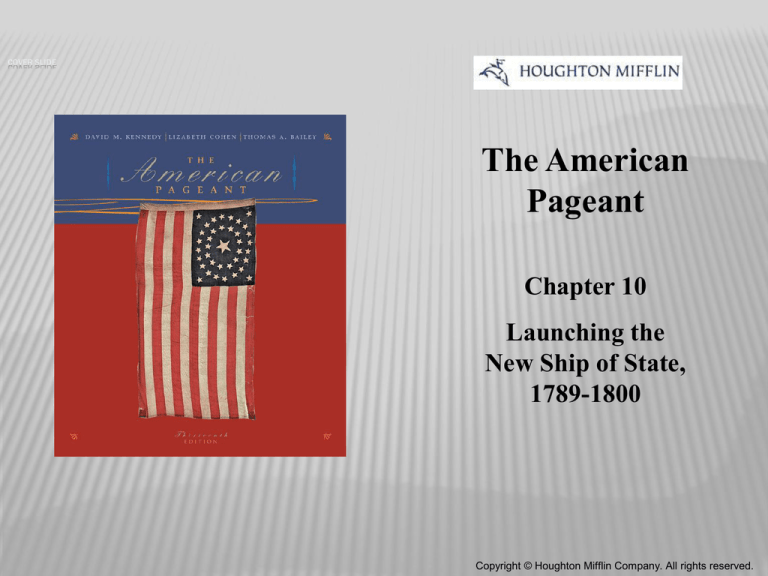
COVER SLIDE
The American
Pageant
Chapter 10
Launching the
New Ship of State,
1789-1800
Copyright © Houghton Mifflin Company. All rights reserved.
GROWING PAINS
The population was 2x every 25 years
First census = 1790
4
million people
90% rural
5% lived west of Appalachians
WASHINGTON AS PRESIDENT
Only presidential nominee
in 1788
Inaugurated April 1789
Established the cabinet
Not
mentioned in the
Constitution
Only 3 departments at first
Secretary
of State (Jefferson)
Secretary of Treasury
(Hamilton)
Secretary of War (Knox)
George Washington by John
Trumbull, miniature, 1792–1794
John Trumbull, known primarily for
his larger-than-life portraits of
patriot leaders, painted this
miniature (c. 1792–1794) of
George Washington, who posed for
it during his presidency. (Division
of Political History, Smithsonian
Institution, Washington, D.C.)
THE BILL OF RIGHTS
Writing Bill of Rights = priority
2 ways to amend Constitution:
1.
2.
New constitutional convention (requested by 2/3
of the states
2/3s of both houses of Congress
James Madison (wrote Bill of Rights) guided
them through Congress (easier route)
Fear of more Fed vs Anti-fed feelings if there was
a new convention
THE BILL OF RIGHTS
1791:
Adopted by states
1st 10 Amendments
to the Constitution
Ninth Amendment:
Assures
people that these aren’t the only rights
people have
Tenth Amendment:
Appeases
states’ righters, giving all rights not listed
or prohibited to the states
THE BILL OF RIGHTS
Judiciary Act of 1789:
Congress
organizes the Supreme Court:
Chief
Justice (first = John Jay)
5 Associate justices
Creates
federal district and circuit courts
Creates another CABINET office:
Attorney
General
ALEXANDER HAMILTON BY CHARLES WILSON PEALE
Alexander Hamilton by Charles Wilson Peale
Author of many of The Federalist Papers essays
and first Secretary of the Treasury, Alexander
Hamilton was admired, even by bitter political
opponents, for his intellectual brilliance and his
political vision. Hamilton was a true American
success story: an illegitimate son of a Barbados
gentleman, he immigrated to the mainland as a
teenager where he enjoyed a meteoric career.
Hamilton served as Washington's aide-de-camp,
became a leader of the New York bar, and entered
New York's social elite by his marriage into the
Schuyler family. In 1803, a political enemy,
Aaron Burr, killed Hamilton in a duel. (Courtesy
Independence National Historical Park
Collection)
Copyright © Houghton Mifflin Company. All rights reserved.
HAMILTON REVIVES PUBLIC CREDIT
Hamilton wants to fix economic issues that
existed under Articles of Confederation
1.
Bolster credit: urges Congress (1790) to “fund” the
entire national debt “at par” (meant at face value)
Means taking over (assumption of) states’ debts from the
war
Created speculation
People believed govt couldn’t pay debt
Believed bonds were worth only 10-15 cents on the dollar, sold
readily
Other motive = make state govt dependent on national govt
States with large debts (MASS) liked it
States with small debts (VA) hated it
Hamilton persuades VA by promising to move capital to Washington
DC
CUSTOM DUTIES AND EXCISE TAXES
National debt = $75 million
Hamilton = “Father of the National Debt”
wasn’t worried
Believed
that debt mean we had people/countries
that had a stake in our success
How to pay interest on debt?
Customs
duties = tariffs
First
tariff = 1789 (slight tariff to protect infant
manufacturing)
Excise
tax on few domestic items
Whiskey
= most significant
Western farmers distilled most of the whiskey
HAMILTON BATTLES JEFFERSON FOR A BANK
What is Hamilton’s vision?
Private institution
Govt = major stockholder
Federal Treasury deposits money
Federal funds would stimulate business
Print stable national currency
Was it constitutional?
Jefferson says no, it’s a states’ right since Constitution
doesn’t specifically call for a national bank
Hamilton says yes. It’s not prohibited by the
Constitution
HAMILTON BATTLES JEFFERSON FOR A BANK
Hamilton’s constitutional argument:
Constitution
says laws can be passed by Congress if
they are “necessary and proper” to carry out
powers that are listed (enumerated) in the
Constitution
Thus, bank is “necessary and proper” to collect
taxes and regulate trade
So?
These
are “implied powers” of Congress
HAMILTON BATTLES JEFFERSON FOR A BANK
Hamilton = loose or broad interpretation of the
Constitution (also called “loose construction”)
by invoking the “elastic clause”
Read
So?????
Set
between the lines
a precedent for so many more federal powers
FYI: Jefferson = strict constructionist
Read
word-for-word
HAMILTON BATTLES JEFFERSON FOR A BANK
First Bank of the United States created by
Congress (1791) with a 20 year charter (we get
to talk about this again in a few chapters!)
Located
in Philadelphia
1/5 owned by federal govt
ALEXANDER HAMILTON BY JOHN TRUMBULL, 1792
Alexander Hamilton by John
Trumbull, 1792
Hamilton's self-confident pride clearly
shines through in this portrait, painted at
the height of his influence in the
Washington administration. (Courtesy of
Donaldson, Lufkin & Jenrette Collection
of Americana)
Copyright © Houghton Mifflin Company. All rights reserved.
MUTINOUS MOONSHINERS IN PENNSYLVANIA
Whiskey Rebellion:
1794
Hamilton’s excise tax = problem for avg western pioneer
Defiant distillers erect whiskey poles
“Liberty
and No Excise”
Tar and feathered revenue officers
Washington summons the troops
Puts
down rebellion
So?
Showed
that govt could now handle problems
Unlike Shays’ rebellion
THE EMERGENCE OF POLITICAL PARTIES
Hamilton’s acts put US on sound credit rating
Not everyone liked:
Agst states’ rights
Political enemies
Framers didn’t envision political parties
Funding, assumption
Bank
Suppression of Whiskey Rebellion
Organized resistance to the government seemed agst ideals
the Revolution fought for.
By the end of Washington’s first term 2 parties
emerged:
Federalists (Hamilton)
Democratic-Republicans (Jefferson)
THE IMPACT OF THE FRENCH REVOLUTION
Federalists feared the “mobocracy”
Democratic-Republicans regretted bloodshed,
but championed the cause
When Britain drawn into the fight, the battle for
the Atlantic had been revived
WASHINGTON’S NEUTRALITY PROCLAMATION
US still had Franco-American Treaty of 1778
with France
GB
threatening to attack West Indies
Democratic-Republicans wanted to honor treaty
GW knew that US wasn’t ready for war
1793 issues the Neutrality Proclamation
Declared
our neutrality
Also warned citizens to remain impartial
WASHINGTON’S NEUTRALITY PROCLAMATION
Citizen Genêt affair
French representative lands in
Charleston, SC
Decides that Americans aren’t
neutral
Gathers army to fight Spanish
Florida, Louisiana and British
Canada
Threatens to go beyond
Washington to the citizens
Eventually is removed from
America
Edmond Genêt by Ezra Ames, 1809–
1810
Citizen Edmond Genêt's visit caused the
first major diplomatic crisis in the new
nation. His attempts to enlist Americans
in support of the French Revolution
raised troubling questions about the
international role of the United States.
(Collection of the Albany Institute of
History and Art. Bequest of George
Genêt.)
EMBROILMENTS WITH BRITAIN
The Treaty of Greenville 1795:
Gave
America all of Ohio
after General Mad Anthony Wayne battled and
defeated the Indians at the Battle of Fallen
Timbers.
Indians got $20,000 lump sum and $9k annually
Significance:
Allowed
Americans to explore the area with peace of
mind that the land belonged to America
added size and very fertile land to America.
NATIVE AMERICAN SIGNATURE MARKS ON GREENVILLE TREATY
Native American signature marks on Greenville Treaty
Independence sparked renewed westward migration by land hungry Americans. The federal
government took steps to legitimate these incursions into Indian homelands by persuading
selected chiefs and warriors of the northwest to cede all rights to vast tracts of this Ohio Valley
land. The document pictured here provides a sample of the eleven hundred signatures obtained
in the Greenville Treaty of 1795, a treaty that ceded almost two-thirds of present day Ohio and
portions of Indiana. Many tribes protested such treaties on the grounds that the signers were not
legitimate spokesmen for their people. (Library of Congress)
Copyright © Houghton Mifflin Company. All rights reserved.
EMBROILMENTS WITH BRITAIN
On the sea:
GB
wanted to control West Indies
Seized about 300 American merchant ships in the
West indies:
Impressed
Angered
Esp
seamen into service on GB vessels
Americans
Jeffersonians…
But Federalists dependent on trade with GB
JAY’S TREATY AND WASHINGTON’S FAREWELL
Avoiding war GW sends Jay to GB (1794)
Negotiates
Jay’s Treaty
Britain promises:
evacuate
the chain of posts on U.S. soil
pay damages for recent seizures of American ships.
would
not promise:
to leave American ships alone in the future
and they decided that the Americans still owed British
merchants for pre-Revolutionary war debts.
many
Southerners especially, were angry
rioted
and called John Jay the "Damn'd Arch traitor."
JAY’S TREATY AND WASHINGTON’S FAREWELL
Consequences of Jay’s Treaty:
Foreshadows
Anglo-American Alliance
Spain strikes a deal with the US
Pinckney’s Treaty (1795): with Spain
US
gains free navigation of the Mississippi
Gains large area of north Florida.
JAY’S TREATY AND WASHINGTON’S FAREWELL
Washington retires after 2 terms
Washington’s Farewell Address (1796):
Document
by GW when he retired from office.
Was printed in newspapers.
It did not concern foreign affairs
most of it was devoted to domestic problems.
Warned against permanent alliances
He also spoke against partisan bitterness. (political
parties)
JOHN ADAMS BECOMES PRESIDENT
Who next?
Not
A. Hamilton,
Unpopular
Went
with his financial policies
with J. Adams, GW’s vp
Election of 1796:
Adams
(Federalist) v. Jefferson (Dem-Rep.)
issues
= Jay’s hated treaty & crushing of Whiskey
Rebellion
Runner-up became vp
UNOFFICIAL FIGHTING WITH FRANCE
FRENCH hated Jay’s Treaty
Believed
it was a step towards an Anglo-American
Alliance
Violated Franco-American Treaty of 1778
Began to seize American merchant vessels
What did he do?
Sends
an envoy of 3 to Paris in 1797
UNOFFICIAL FIGHTING WITH FRANCE
XYZ Affair: (1797)
Adams sent a diplomatic commission to France to settle
matters about the upset of the Jay Treaty of 1794.
French thought that Am. was siding with the English
violating the Franco-American Treaty of 1778.
Commission sent to talk to Talleyrand about the seizing of
American ships by the French.
Communication b/w the commission & Talleyrand existed
b/w 3 go betweeners (XYZ) because talking to Talleyrand in
person would cost a quarter of a million dollars.
started an undeclared war with France.
PROPERTY PROTECTED, A LA FRANCOISE
Property Protected, a la Francoise
This cartoon, drawn during the XYZ affair, depicts the United States as a maiden
being victimized by the five leaders of the French government's directorate. In the
background, John Bull (England) watches from on high, while other European
nations discuss the situation. (The Lilly Library, Indiana University, Bloomington,
Indiana)
Copyright © Houghton Mifflin Company. All rights reserved.
UNOFFICIAL FIGHTING WITH FRANCE
Bloodshed confined to the sea
American privateers and men-of-war captured
80+ vessels flying French flags
Close to war
ADAMS PUTS PATRIOTISM ABOVE PARTY
Adams decides not to pursue a “war” with
France
Sends envoys to France to create peace
Convention of 1800:
Agreement
to end alliance with France
Also France agrees to pay American shippers’
damage claims
Long reaching effect?
Smoothed
way for Jefferson to purchase Lousiana
THE FEDERALIST WITCH HUNT
Series of laws passed by Congress to minimize
Jeffersonian foes
Alien
Act: (most immigrants were scorned by
Federalists as lacking wealth & welcomed by
Jeffersonians) raised residence requirement to be
citizens from 5 to 14 years.
later law allowed president to deport dangerous
foreigners during times of peace
Also another law allowed president to deport or imprison them in
times of hostilities
Never
enforced
Increased power of Executive (presidency)
THE FEDERALIST WITCH HUNT
Sedition Act: aimed at freedom of
speech/press
Anyone
who impeded the policies of the gov’t or
falsely defamed its officials (including pres) would
be liable to a fine/imprisonment
How can they justify this law?
Verbal
violence was unrestrained and Adams’s antiFrench policy was vilified.
THE FEDERALIST WITCH HUNT
Impact of Sedition Act:
Jeffersonian
editors indicted
Supreme Ct. was dominated by Federalists
Didn’t
declare law unconstitutional
Federalists
wrote law to expire in 1801 (in case they
didn’t win the next election)
CONGRESSIONAL PUGILISTS, 1798
Congressional Pugilists, 1798
A cartoonist satirizes the fiercely partisan debates in Congress surrounding the Alien
and Sedition Acts. (Library of Congress)
Copyright © Houghton Mifflin Company. All rights reserved.
THE VA (MADISON) & KY (JEFFERSON) RESOLUTIONS (1798)
Stated that the Alien & Sedition Acts were null.
Believed that "nullification was the rightful
remedy". Virginia & Kentucky were the only
states that voted for this nullification, which is
to make a law invalid.
Based
the
on the Compact Theory
13 states, by creating the federal government, had
entered into a contract about its jurisdiction.
The nat’l govt = the agent of the states.
individual states = final judges of the nat’l government's
actions.
THE VA (MADISON) & KY (JEFFERSON) RESOLUTIONS (1798)
Will be used later by southerners to support
nullification and later SECESSION
FEDERALISTS VERSUS DEMOCRATIC-REPUBLICANS
See table on page 108 for differences

